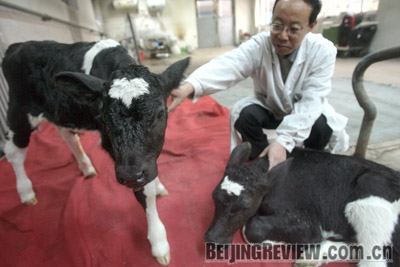|
|

|
|
BIO-TECH: China has mastered mature genetic engineering technology. This photograph shows a researcher with two cloned cows at an animal research center in Beijing |
Chinese scientists have successfully bred a genetically altered cow capable of producing cancer-curing proteins for human beings.
"If we compare the cancer cells to iron, then the proteins our milk cow produces are like magnets, which can find and hold down these cells firmly," said Li Ning, an academician with the Chinese Academy of Engineering. "More importantly, these proteins only kill cancer cells without causing any damage to other cells."
According to Li, the CD20 human monoclonal (produced from a single cell) antibody could be purified from the milk of the transgenic cow, born on August 2, and used to treat B-cell lymphomas and leukemia, as well as some autoimmune diseases.
A low antibody expression level and the high cost of production facilities have been a stumbling block in the industrial production of the antibody drug, which was approved by the U.S. Food and Drug Administration in 1997.
Li expected the achievement of his research team would significantly lower the cost of the CD20 antibody production. Currently, an injection of the antibody costs around $4,000, which is too high a price for many cancer sufferers. Sales of this kind of medicine reach an average of $3 billion around the world each year.
To reduce the cost of the drug, Li and his colleagues at the China Agriculture University began to seek an answer by doing tests on mice. They grafted the CD20 antibody derived from human cells onto the genes that control milk production. They were happy to see that the milk the mice produced contained the CD20 antibody.
Afterward, the researchers conducted the same tests on cows and the result was satisfying. They then merged an antibody-?including cell with an egg cell from a female cow to form an embryo, creating a cloned transgenic milk cow.
"The objective of our research is to make the transgenic animal express the antibody at high levels," said Li, adding that transgenic mice had been able to express 10 mg/ml of the CD20 antibody on average in tests.
Theoretically, the amount of the CD20 antibody that is produced by a mouse can cure a person. "The new method could bring down the production cost of the antibody to between one 50th and one 100th of the current level, an affordable price for ordinary patients," said Li.
The current two major cancer treatments are radiation treatment and chemotherapy, both of which have serious side effects on humans. Radiation or poisonous chemicals could damage normal cells as well as cancer cells, causing immune suppression or even damaging the whole immune system, Li said.
China cannot produce the CD20 antibody on its own and depends on imports at present. The United States produces the antibody through fermentors, but to build such a factory costs at least $400 million.
"It's too difficult for our country to acquire the technology and build such chemical facilities," Li said.
The U.S.-based Business Communica-tion Corp. has estimated the worldwide market for transgenically sourced therapies at more than $1 billion in 2008, and $18.6 billion by 2013.
Although the scientists have been successful with their experiments, Li said they still had a long way to go before entering the clinical application phase. For example, they still have to discover how to purify the CD20 antibody in the milk at a high level of efficiency and whether the CD20 antibody derived from the cow milk is exactly the same as those produced in fermentors.
Li's team planned to complete the clinical study of the first functional food with the CD20 antibody in three years, and apply for the production authorization from the state food and drug authorities. The first functional drug could be expected in five years. | 